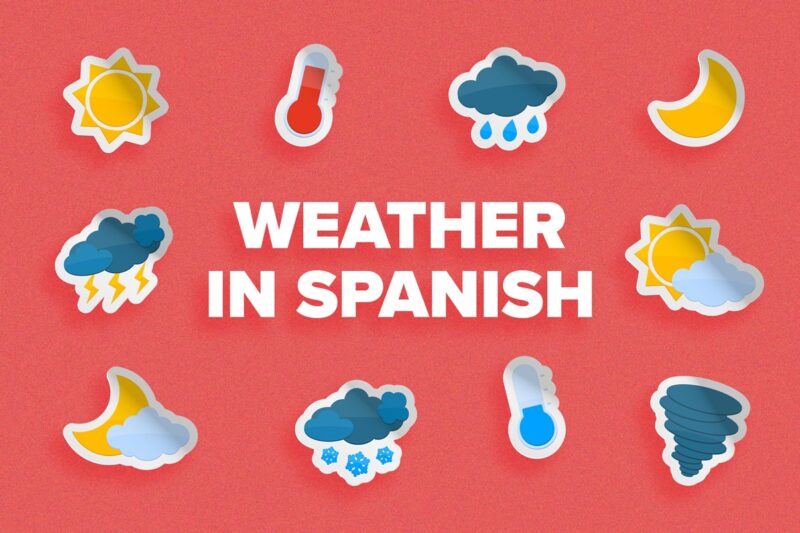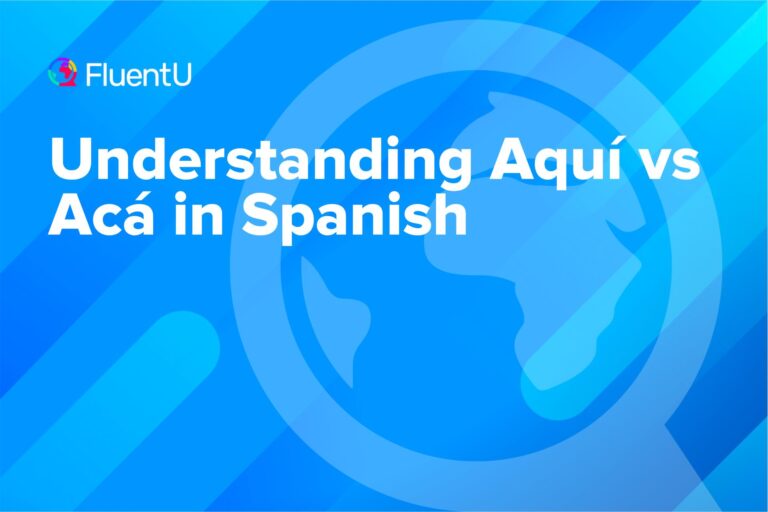100+ Terms for the Weather in Spanish

Over the past two years of my time abroad in Spain, there have been countless moments when bringing up the weather has saved me from otherwise uncomfortable silences with Spaniards.
Luckily, the weather in Madrid is sporadic enough to always be a relevant topic when I find myself grasping at straws to make small talk.
Read on to learn more than 100 weather expressions in Spanish, so you can say way more than just hace calor (it’s hot) and hace frío (it’s cold).
Download: This blog post is available as a convenient and portable PDF that you can take anywhere. Click here to get a copy. (Download)
How to Ask About the Weather in Spanish

Like in English, there are multiple ways to ask about the weather in Spanish. Here are a few common questions you’ll hear and use all the time:
- ¿Cómo está el clima? (How is the weather? [long-term climate])
- ¿Cómo está el tiempo? (How is the weather? [short-term weather])
- ¿Qué tal el clima? (What’s the weather like?)
- ¿Qué tiempo hace? (How’s the weather?)
- ¿Cómo es afuera? (How is it outside?)
- ¿Cómo está por fuera? (How is it outside?)
- ¿Cómo está el tiempo hoy? (How is the weather today?)
- ¿Qué temperatura hace hoy? (What is the temperature today?)
- ¿Va a llover hoy? (Is it going to rain today?)
- ¿Cuál es la previsión del tiempo para mañana? (What is the weather forecast for tomorrow?)
- ¿Hace viento hoy? (Is it windy today?)
- ¿Cuántos grados hace ahora? (How many degrees is it right now?)
- ¿Hay tormenta en el pronóstico? (Is there a storm in the forecast?)
- ¿Cómo estará el clima durante el fin de semana? (What will the weather be like during the weekend?)
- ¿Necesitaré llevar un paraguas hoy? (Will I need to bring an umbrella today?)
If you want a little extra practice with this, you can check out this lesson on seasons from our YouTube channel:
Common Spanish Weather Words

| Spanish | English |
|---|---|
| El tiempo | Weather |
| El clima | Climate, weather |
| Llover | To rain |
| Nevar | To snow |
| Tronar | To thunder |
| Chispear | To drizzle |
| Lloviznar | To drizzle |
| La granizada | Hailstorm |
| El bochorno | Sultry or muggy weather |
| La tormenta | Storm |
| La racha / ráfaga | Gust (of wind) |
| El sol | Sun |
| La luna | Moon |
| La nube | Cloud |
| El viento | Wind |
| La nieve | Snow |
| El hielo | Ice |
| La niebla | Fog |
| El granizo | Hail |
| El pronóstico | Forecast |
| Grados | Degrees |
| La brisa | Breeze |
| La tormenta de nieve | Blizzard |
| La sequía | Drought |
| Seco | Dry |
Spanish Weather Expressions with Verbs Hacer, Haber and Estar

Hacer — The weather “does” or “makes”
Oh hacer, that complex Spanish verb that seems like it can mean so many different things. When talking about the weather, we use the hace form.
Here are a bunch of ways to talk about the weather using hacer.
| Spanish | English |
|---|---|
| Hace buen tiempo | The weather is good |
| Hace un día despejado | It’s a clear day |
| Hace mal tiempo | The weather is bad |
| Hace un día tormentoso | It’s a stormy day |
| Hace frío | It’s cold |
| Hace calor | It’s hot |
| Hace fresco | It’s brisk/chilly |
| Hace sol | It’s sunny |
| Hace un día soleado | It’s a sunny day |
| Hace viento | It’s windy |
| Hace aire | It’s breezy |
| Hace un calor tremendo | It’s scorching hot |
| Hace muchísimo frío / calor | It’s very, very cold/hot |
| Aquí siempre hace mucho frío / calor en esta época | It’s always very cold/hot here at this time of the year |
| Hace un día horrible | It’s a horrible day (weather wise) |
| Hace un día muy bueno / malo | It's a very good/bad day |
| No hace nada de frío / calor | It’s not cold/hot at all |
| Hace un frío que pela | It’s freezing cold |
Haber — “There is” weather
Another Spanish all-purpose verb and helping verb, for haber, you use the hay form, which means something like “there is.”
| Spanish | English |
|---|---|
| Hay nubes | It's cloudy |
| Hay lloviznas | It's sprinkling |
| Hay lluvias torrenciales | It's pouring |
| Hay granizo | It's hailing |
| Hay humedad | It's humid |
| Hay niebla | It's foggy |
| Hay neblina | It's misty |
| Hay tormenta | It's stormy |
| Hay relámpagos | It’s lightning |
| Hay un huracán | There’s a hurricane |
| Hay un tornado | There’s a tornado |
| Hay un terremoto | There’s an earthquake |
| Hay una inundación | There’s a flood |
| Hay sol | The sun is shining |
| Hay luna | The moon is out |
To dive deeper into the verb haber, click over to this post.
Estar — The weather “is”
When using estar to talk about the weather, you usually use the third-person present form (está).
Here are some common weather phrases in Spanish using estar:
| Spanish | English |
|---|---|
| Está nublado | It's cloudy |
| Está lloviznando | It's drizzling |
| Está lloviendo muy fuerte | It's raining very strong |
| Está granizando | It's hailing |
| Está bochornoso | It’s muggy |
| Está húmedo | It’s humid |
| Estamos a... grados bajo cero | We are at...degrees below zero |
| Estamos a... grados | We're at...degrees |
| Está lloviendo a cántaros | It’s raining cats and dogs |
If you want to review when to use estar and when to use ser, the other Spanish verb for “to be,” check out this handy post.
Other Spanish Weather Expressions

| Spanish | English |
|---|---|
| ¿Tienes frío / calor? | Are you cold/hot? |
| Estoy sudado | I'm sweaty |
| ¡Estoy sudando como un pollo! | I’m sweating like a chicken! (Think: I’m sweating like a pig!) |
| Me estoy asando | I’m roasting |
| Estoy cocido | I’m boiling (hot) |
| Estoy congelado | I’m freezing cold |
| Estoy helado | I'm freezing cold |
| ¡Qué frío / calor tengo! | I am so cold/hot! |
| Me muero de calor / frío | I’m dying of heat/cold |
| Soy muy friolero / friolento | I’m a wimp when it comes to the cold |
| ¡Ay qué calor! | It’s so hot! |
| ¡Qué frío / calor hace! | It’s really cold/hot! |
| Por mucho que quiera ser, en julio poco ha de llover | As much as it wants to rain, in July it will do so very little |
| Julio caliente, quema al más valiente | July heats and burns even the bravest |
| En agosto, sandía y melón buen refresco son | In August, watermelon and melon are good refreshment. |
| La primavera, la sangre altera | Spring is in the air |
| Agosto fríe el rostro | August fries your face |
| Hasta el 40 de mayo, no te quites el sayo | Don’t take your sweater off until May 40th |
May 40th is just a funny way of saying June 9th.
This extremely madrileño (from Madrid) phrase refers to the fact that Madrid weather can be a bit fickle so you shouldn’t assume there will be no rain or cold just because the summer weather seems to have arrived.
Sayo is an old-fashioned Spanish word meaning “smock” or “tunic” but would refer to a sweater in modern times.
Spanish Weather Quiz: Test Yourself!
Do you need some additional help learning how to use these and other weather vocabulary words? An immersion program like FluentU makes it easy to see the words in use by native Spanish speakers.
FluentU takes authentic videos—like music videos, movie trailers, news and inspiring talks—and turns them into personalized language learning lessons.
You can try FluentU for free for 2 weeks. Check out the website or download the iOS app or Android app.
P.S. Click here to take advantage of our current sale! (Expires at the end of this month)

Thanks to all these Spanish weather expressions, you’ll finally have a linguistic umbrella to bring to every Spanish conversation.
You’ll be prepared, rain or shine!
Download: This blog post is available as a convenient and portable PDF that you can take anywhere. Click here to get a copy. (Download)
And One More Thing…
If you've made it this far that means you probably enjoy learning Spanish with engaging material and will then love FluentU.
Other sites use scripted content. FluentU uses a natural approach that helps you ease into the Spanish language and culture over time. You’ll learn Spanish as it’s actually spoken by real people.
FluentU has a wide variety of videos, as you can see here:

FluentU brings native videos within reach with interactive transcripts. You can tap on any word to look it up instantly. Every definition has examples that have been written to help you understand how the word is used. If you see an interesting word you don’t know, you can add it to a vocab list.

Review a complete interactive transcript under the Dialogue tab, and find words and phrases listed under Vocab.

Learn all the vocabulary in any video with FluentU’s robust learning engine. Swipe left or right to see more examples of the word you’re on.

The best part is that FluentU keeps track of the vocabulary that you’re learning, and gives you extra practice with difficult words. It'll even remind you when it’s time to review what you’ve learned. Every learner has a truly personalized experience, even if they’re learning with the same video.
Start using the FluentU website on your computer or tablet or, better yet, download the FluentU app from the iTunes or Google Play store. Click here to take advantage of our current sale! (Expires at the end of this month.)







